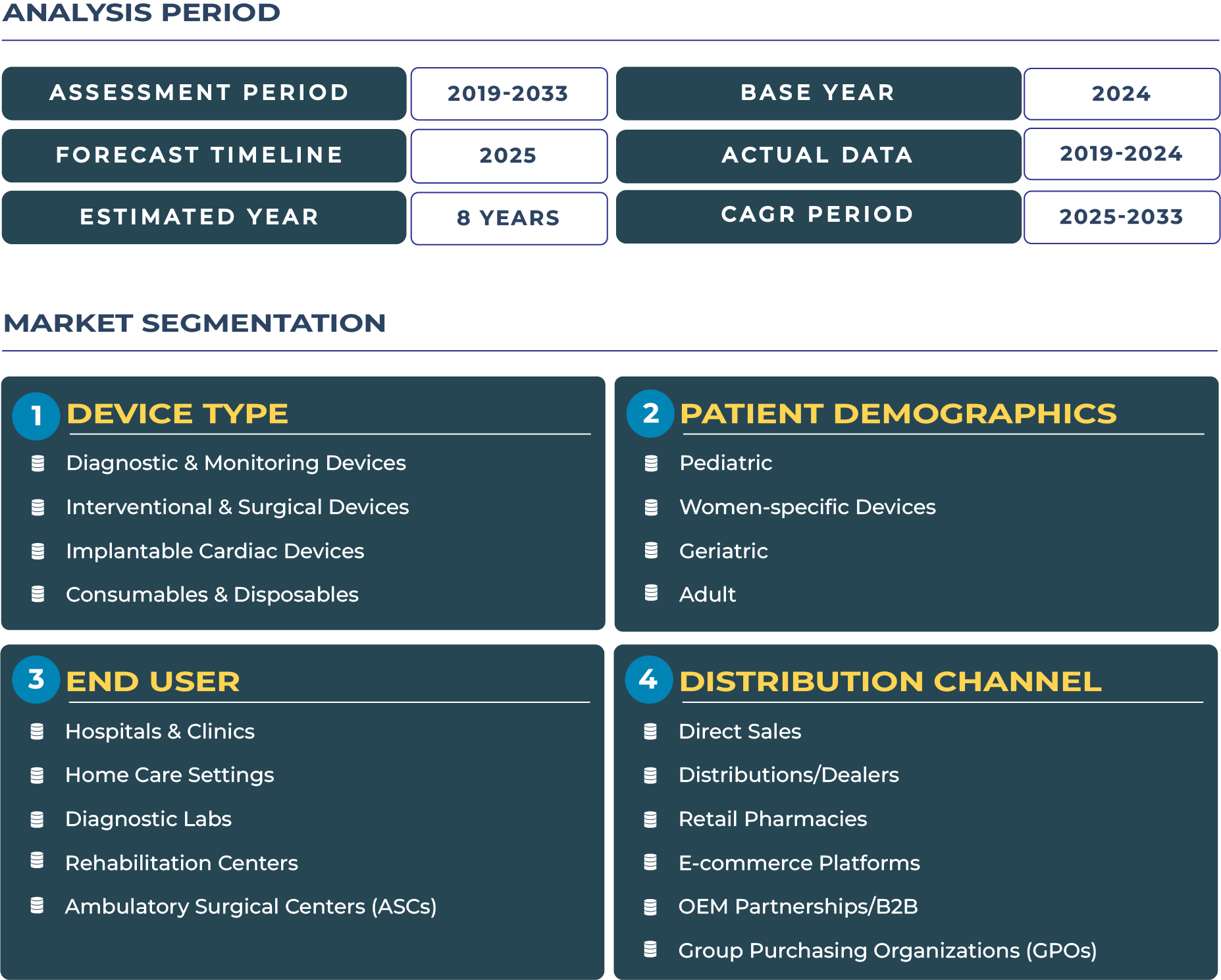New Zealand Cardiovascular Devices Market Outlook
The New Zealand Cardiovascular Devices Market is charting steady growth, underpinned by its universal healthcare structure and commitment to equity mandates. According to DataCube Research, the market is estimated to grow from USD 311.8 million in 2025 to USD 679.3 million by 2033, registering a CAGR of 10.2%. The drivers behind this performance include centralized procurement policies, robust digital health adoption, and integration of cardiovascular diagnostics into national electronic health record systems. Demand is especially strong for diagnostic and monitoring devices used in primary care, as well as surgical tools and consumables that support cardiovascular interventions in public hospitals. Political stability and a strong health policy framework create confidence for international device companies, while localized challenges such as rural access gaps have spurred innovation in remote telemonitoring. The pandemic experience also reinforced the importance of resilient cardiovascular solutions, accelerating investment in preventive monitoring and data-driven healthcare delivery.
New Zealand as a Pilot-Friendly Market for Equity-Driven Cardiovascular Care
New Zealand is increasingly positioned as a pilot-friendly cardiovascular devices market, where universal healthcare and equity-first adoption policies create fertile ground for innovation. The centralized healthcare model, combined with a strong focus on public health equity, ensures that cardiovascular interventions are not restricted to urban populations but extend to underserved communities across the country. Government agencies such as the New Zealand Ministry of Health actively promote early adoption of digital monitoring tools, implantable cardiac devices, and surgical interventions that align with long-term disease prevention strategies. This equity-driven approach makes New Zealand a prime environment for piloting small-scale cardiovascular device deployments, which can later be scaled regionally or internationally. Public procurement mechanisms emphasize not only cost-effectiveness but also alignment with sustainability and accessibility objectives, creating an inclusive cardiovascular devices ecosystem.
Drivers & Restraints: Understanding the Policy-Led Growth of New Zealand’s Cardiovascular Devices Landscape
Driving Factors: Centralized Procurement and Digital Health Integration
One of the primary growth drivers for the cardiovascular devices sector in New Zealand is its centralized procurement approach, which allows for streamlined device adoption across public hospitals and clinics. By negotiating bulk contracts, the healthcare system ensures equitable distribution of advanced devices such as implantable defibrillators and surgical consumables. In parallel, digital health has become a national priority, with cardiovascular monitoring solutions integrated into the country’s electronic health record framework. These structural enablers, coupled with equity mandates that prioritize Indigenous and rural populations, are propelling demand for cardiovascular diagnostics and preventive monitoring tools.
Restraining Factors: Small Market Scale and Budgetary Constraints
Despite positive momentum, the cardiovascular devices industry in New Zealand faces challenges linked to its small commercial scale. With a population of just over five million, the market offers limited revenue opportunities compared to larger Asia-Pacific economies. Tight public health budgets mean that device reimbursement decisions are heavily scrutinized, often requiring extended evidence of clinical cost-effectiveness. Procurement cycles can be lengthy, slowing the entry of new devices into the public system. These factors create hurdles for global companies that may prioritize larger markets before considering New Zealand, though the equity-first procurement approach offers significant pilot opportunities for adaptable innovators.
Trends & Opportunities: Digital Health, Rural Access, and Equity-Centered Pilots Leading the Way
Major Trends: National Digital Health and Remote Monitoring
New Zealand is accelerating adoption of cardiovascular devices through national digital health strategies. Remote monitoring devices, including wearable ECG patches and wireless blood pressure monitors, are increasingly deployed in rural and semi-rural regions to overcome access barriers. Sustainability-oriented procurement also shapes device adoption, with policies favoring suppliers who demonstrate lifecycle efficiency and reduced environmental footprint. These trends indicate that the cardiovascular devices industry is not just about technology, but about aligning innovation with broader healthcare priorities.
Key Opportunities: Pilot-First Deployments and Indigenous Health Solutions
New Zealand’s pilot-first approach to health innovation offers significant opportunities for cardiovascular device companies. Small-scale deployments of implantable cardiac devices, interventional technologies, and disposable consumables are encouraged within public hospitals, allowing companies to demonstrate effectiveness before scaling. Opportunities also lie in equity-focused initiatives that target Indigenous communities, where cardiovascular disease prevalence remains disproportionately high. Tailoring device solutions to meet these needs enhances both public health outcomes and long-term adoption potential. Moreover, integration with national systems ensures that successful pilots can transition into routine practice, making New Zealand a compelling entry point for global cardiovascular innovations.
Competitive Landscape: Strategies and Partnerships Defining the Cardiovascular Devices Sector
The cardiovascular devices ecosystem in New Zealand is characterized by the presence of leading global firms such as Boston Scientific, Medtronic, and Abbott, alongside local distributors and clinical partners. These companies often engage in small-scale clinical pilots in partnership with public hospitals and universities to generate evidence aligned with national procurement requirements. Key developments in recent years include national telemonitoring pilots and rural health deployments designed to improve early cardiovascular diagnosis. A common strategy is to emphasize equity and cost-effectiveness when engaging with public procurement bodies, ensuring that cardiovascular interventions align with both budgetary constraints and policy objectives. This pilot-friendly environment offers international players a platform to refine their devices for broader global rollouts while directly addressing New Zealand’s healthcare priorities.







